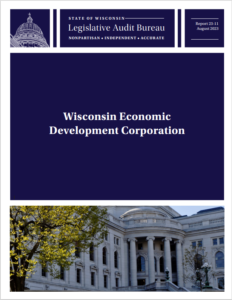
In this update:
- Legislative Updates
- Election Updates
- Administration Updates
Legislative Updates
Republicans pitch new plan to cut taxes
Republican legislators rolled out a nearly $3 billion tax cut bill this week that would reduce income taxes for the third-highest tax bracket to 4.4% from 5.3%, while also expanding an existing tax break on retirement income. The move comes a month after Gov. Tony Evers (D) used his partial veto power to eliminate a GOP-backed measure included in the biennial budget to reduce rates for the state’s top two income tax brackets. At the time, the governor had argued the GOP tax cut disproportionately benefitted the wealthy at the expense of the middle class and was fiscally irresponsible. However, Republicans disputed that notion and vowed to put forward another tax cut, leading to this week’s proposal. “We’re giving the governor a second chance to do the right thing,” Rep. Mark Born (R), Assembly co-chair of the joint committee on finance, said at a press conference announcing the tax reduction package.
According to the proposal, income between $36,840 to $405,550 for married couples filing jointly would be taxed at a reduced rate of 4.4%, a roughly 0.9% reduction from the existing rate. This would account for roughly $2 billion of the price tag of the total tax cut. The other component of the tax cut bill would allow individuals 67 and older to subtract up to $100,000 in payments from qualified retirement plans from their taxable income. That number would increase to $150,000 for married couple where both spouses are at least 67. According to the Legislative Fiscal Bureau, it is estimated that
1.73 million filers would receive tax decreases totaling $1.3 billion, for an average decrease of $772 in tax year 2023.
Gov. Evers administration raised concerns the tax cut bill could jeopardize roughly $2.5 billion in federal COVID-19 funds received by the state and local governments. The U.S. Treasury prohibits states that received American Rescue Plan Act (ARPA) funds to use those funds to directly or indirectly offset a reduction in net tax revenue. According to a memo from State Budget Director Brian Pahnke addressed to Gov. Evers and DOA Sec. Kathy Blumenfeld, the state could reduce taxes by $113 million for FY 2023-24 and $319 million for FY 2024-25 before possible having to pay back ARPA funds to the federal government. However, GOP legislators have said they are not concerned and pointed to other states that have cut taxes without having to repay the funds. The Legislative Fiscal Bureau also mentioned in a June budget paper prepared for JFC that it had requested clarification on the provision from the Treasury Department, but had not received a response. The paper goes on to note “It remains unclear whether the recoupment provision under ARPA is enforceable at all.”
During a public hearing on the bill, Committee on Ways and Means chairman Rep. John Macco (R) said the committee would take the measure up in an executive session on Sept. 6. Assembly Speaker Robin Vos (R) has previously said he anticipated the Assembly would take a floor vote on the tax cut bill after Labor Day.
Republican legislators rolled out a nearly $3 billion tax cut bill this week that would reduce income taxes for the third-highest tax bracket to 4.4% from 5.3%, while also expanding an existing tax break on retirement income. The move comes a month after Gov. Tony Evers (D) used his partial veto power to eliminate a GOP-backed measure included in the biennial budget to reduce rates for the state’s top two income tax brackets. At the time, the governor had argued the GOP tax cut disproportionately benefitted the wealthy at the expense of the middle class and was fiscally irresponsible. However, Republicans disputed that notion and vowed to put forward another tax cut, leading to this week’s proposal. “Now that the state budget has been finalized and our priorities have been funded, the focus will be on what to do with the billions in surplus that still remain,” said Assembly Majority Leader Tyler August. “Our current surplus is the result of the taxpayers paying too much, rather than the government spending too little. Our goal is to get the surplus out of Madison and back into the pockets of its rightful owners: the taxpayers. Republicans have put forth a plan to return the billions in the form of a middle class income tax cut paired with a tax-free retirement. The average taxpayer is expected to see a reduction of $772 in taxes. Further, we’ve included a constitutional amendment that would make it harder for the legislature to raise taxes. This fall, our top priority will be getting the money back to families and seniors before big government liberals and special interests can spend it on new, unnecessary government programs.”
GOP lawmakers announce package of bills to address child care costs
 Republican state lawmakers unveiled a package of six bills this week to address rising childcare costs. Dubbed “Choices in Childcare,” the legislative package comes a few weeks before a September 20th special session of the legislature called by Gov. Tony Evers to address the state’s “chronic workforce challenges.” While Gov. Evers had proposed spending more than $340 million to subsidize the state’s childcare providers as part of a broader workforce package, Assembly Speaker Robin Vos (R) rejected that idea and said his caucus would focus on proposals that would reduce regulations. “It’s kind of preposterous to say that we are gonna take taxpayer dollars from everybody to subsidize one specific industry, like child care,” Speaker Vos said. “We are not going to increase wages for child care workers by having everyone else pay more.”
Republican state lawmakers unveiled a package of six bills this week to address rising childcare costs. Dubbed “Choices in Childcare,” the legislative package comes a few weeks before a September 20th special session of the legislature called by Gov. Tony Evers to address the state’s “chronic workforce challenges.” While Gov. Evers had proposed spending more than $340 million to subsidize the state’s childcare providers as part of a broader workforce package, Assembly Speaker Robin Vos (R) rejected that idea and said his caucus would focus on proposals that would reduce regulations. “It’s kind of preposterous to say that we are gonna take taxpayer dollars from everybody to subsidize one specific industry, like child care,” Speaker Vos said. “We are not going to increase wages for child care workers by having everyone else pay more.”
A spokesperson for Gov. Tony Evers (D) said the governor would not sign any bills that reduce the quality of care in the child care industry or fail to keep child care centers open. “Legislation that could reduce the quality of care for our kids, fails to keep child care center doors open tomorrow, and provides no immediate help to make child care more affordable for working families simply will not cut it,” Britt Cudaback said.
The Republican legislative package includes:
- LRB-4198, sponsored by Rep. Joy Goeben (R): Raises the maximum number of children a child care provider can care for;
- LRB-4197, sponsored by Rep. Joy Goeben (R): Raises the maximum number of children who can be in a group center at once;
- LRB-3258, sponsored by Rep. Joy Goeben (R): Allows parents and guardians to open a state-issued child care reimbursement account. Individuals could then contribute a combined $10,000 per year to those accounts to pay for child care expenses and deduct the contribution from their state taxes.
- LRB-3294, sponsored by Rep. Joy Goeben (R): Reduces the minimum age from 18 to 16 to independently supervise children alone, and reduces the minimum age from 17 to 16 for assistant child care teachers;
- LRB-3168, sponsored by Rep. Joy Goeben (R): Creates a new category of large family-based daycare centers and increases the maximum number of slots to 12 children instead of eight;
- LRB-3161, sponsored by Rep. Karen Hurd (R): Creates a revolving loan program under WEDC for child care center renovations.
New constitutional amendment would require 2/3 vote to increase taxes
 GOP legislators led by freshman state Rep. Amy Binsfeld (R) introduced Assembly Joint Resolution 66, a proposed amendment to the state Constitution that would require a two-thirds majority in both chambers of the legislature to increase taxes statewide. That would equate to 22 votes in a full session of the state Senate and 66 votes in a full session of the state Assembly. “Since 2011, Legislative Republicans have worked to reduce taxes by over $22 billion, and reduced income and franchise taxes by over $13 billion, which has led to economic prosperity and record budget surpluses,“ Rep. Binsfeld said in a press release announcing the legislation. “The legislature should take the necessary steps to make sure it is extremely difficult to reverse those actions.”
GOP legislators led by freshman state Rep. Amy Binsfeld (R) introduced Assembly Joint Resolution 66, a proposed amendment to the state Constitution that would require a two-thirds majority in both chambers of the legislature to increase taxes statewide. That would equate to 22 votes in a full session of the state Senate and 66 votes in a full session of the state Assembly. “Since 2011, Legislative Republicans have worked to reduce taxes by over $22 billion, and reduced income and franchise taxes by over $13 billion, which has led to economic prosperity and record budget surpluses,“ Rep. Binsfeld said in a press release announcing the legislation. “The legislature should take the necessary steps to make sure it is extremely difficult to reverse those actions.”
The bill received a public hearing on Wednesday where Rep. Binsfeld said raising taxes should be “an absolute last resort,” and also noted 16 states currently require a two-thirds majority vote for tax increases. For the state Constitution to be amended, the proposal must pass two consecutive sessions of the legislature and then be approved by voters in a referendum. It would not be subject to a gubernatorial veto.
LAB releases audit of WEDC
 The Legislative Audit Bureau (LAB) released its biennial financial audit of the Wisconsin Economic Development Corporation (WEDC) and a program evaluation audit of WEDC’s economic development programs.
The Legislative Audit Bureau (LAB) released its biennial financial audit of the Wisconsin Economic Development Corporation (WEDC) and a program evaluation audit of WEDC’s economic development programs.
Key findings made by LAB include:
- WEDC failed to modify the Enterprise Zone’s written procedures to comply with state statute that requires tax credits to only be awarded for wages paid to employees for services performed in an enterprise zone;
- Between March 2020 and June 2023, WEDC awarded five grants totaling $50,000 to ineligible recipients through a program supported by federal funds. The agency also did not require eight grant recipients to repay $64,300 in federal funds used outside the contractually specified periods or not verified;
- WEDC fell short of its job creation goals for FY 2021-22, creating only 66.9% of the planned number of jobs;
- WEDC’s online dashboard available to the public contained errors on the number of jobs created and retained;
- Between May 2022 and May 2023, the agency failed to revoke 20 awards totaling $2.6 million in tax credits even though the recipient did not meet their obligations. The audit found the agency lacked written policies requiring it to revoke tax credits in a timely manner;
- WEDC failed to allocate all of its funding in FY 2021-22 with $13 million left unobligated.
Read the full report: click here
Election Updates
Pfaff to run for reelection to state senate
State Sen. Brad Pfaff (D) announced he will seek reelection in 2024 to his state Senate seat. He was last elected in 2020 when he defeated his GOP opponent with 50.3% of the total vote. In his announcement, Sen. Pfaff hinted that the balance of power in the legislature may be changing next year due to redistricting litigation being considered by the new Democratic majority on the state Supreme Court. “Next year brings the potential for real change coming to Madison and with that change, we must continue to build a better tomorrow for Wisconsin,” Sen. Pfaff said. Republicans currently maintain a supermajority in the Senate, outnumbering Democrats 22-11. Democrats will need Sen. Pfaff to maintain his 32nd Senate District seat if they hope to gain the majority in the Senate in 2024. The 32nd Senate District is in southwestern Wisconsin and currently comprises all of Crawford County, nearly all of La Crosse and Vernon counties, and most of the southern half of Monroe County. Cities in the district include La Crosse, Onalaska, Prairie du Chien, and Viroqua. Those boundaries could change if new maps are approved by the state Supreme Court.
Implications for WI 3rd Congressional District Race
Sen. Pfaff’s announcement means he will not be launching another bid to unseat Rep. Derrick Van Orden (R) from western Wisconsin’s 3rd Congressional District. Sen. Pfaff was the 2022 Democratic nominee for the 3rd CD and lost to Rep. Van Orden by 3.7 percentage points in the general election. Deb McGrath, a former CIA and U.S. Army officer who took third place in the Democratic primary for the 3rd CD also announced this week that she would not run for the seat again in 2024. Meanwhile, WEDC Secretary and CEO Missy Hughes has also reportedly ruled out a bid. That leaves Rebecca Cooke as the sole Democratic contender for the 3rd CD who has ties to the district. Ms. Cooke was runner-up to Sen. Pfaff in the Democratic primary and officially launched her second bid for the 3rd CD in July. Other names being floated as possible Democratic candidates include state Rep. Katrina Shankland (D) and La Crosse County Board chair Tara Johnson.
First Lady visits Madison, hosts joint fundraiser with Baldwin
First Lady Jill Biden visited Madison this week to tour Exact Sciences’ lab and attend a listening session at the Foundation for Black Women’s Wellness. The First Lady’s visit is part of the Biden Administration’s focus on promoting access to early cancer screenings. Mrs. Biden also attended an event with the National Education Association and American Federation of Teachers where she was joined by U.S. Senator Tammy Baldwin (D) and Gov. Tony Evers (D). Afterwards, Sen. Baldwin hosted a joint fundraiser with Mrs. Biden for the Biden Baldwin Victory Fund that was reportedly attended by around 200 people. Gov. Evers spoke at the fundraiser where he said Republicans are “looking for the most extreme candidate to challenge” Sen. Baldwin in her 2024 reelection bid. Republican Party of Wisconsin Chairman Brian Schimming released a statement that said the First Lady’s “visit to Madison shows who is top of mind, not only for the Biden administration, but for Tammy Baldwin — who is beholden to the teachers’ unions.”
Administration Updates
DOR releases memo on general fund tax collections
This week, the Department of Revenue released a preliminary estimate of general fund tax collections for FY 2023. According to the memo, general purpose revenue (GPR) increased 2.1% in FY23 to nearly $21 billion. This is .1% less than the Legislative Fiscal Bureau’s May 2023 estimate, roughly a difference of $14.1 million. The release notes these figures have not yet been audited and will be reviewed by the State Controller’s Office prior to the publication of the Department of Administration’s Annual Fiscal Report, which will be released October 15, 2023.



